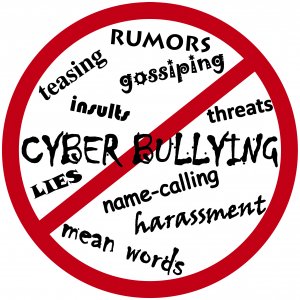We live in a world our mothers probably never dreamed of when they were kids. Could anyone have ever imagined there would be something like the Internet or cell phones? Facebook or Twitter? We can be in touch with one another almost anytime we want. We can store our pictures, our videos, and our memories so that they can never get lost or damaged. Our parents feel comfortable giving us more freedom because with a cell phone we’re never farther than a phone call or a text message away. All this technology connects us and gives us the opportunity to stay in touch, to reach out, and to be closer to our friends and family than any generation before us. All these wonderful inventions, from e-mail to smartphones, have the potential to build us up. Unless they tear us down first.
It’s called cyberbullying-using electronic technology to harass another person. Some studies show that 20 percent of all people will experience cyberbullying by the time they are eighteen years old. And girls are more likely to be cyberbullied than boys. All these new technologies and social networks have the potential to make the problem much, much, worse. How many of you have ever texted something mean about somebody? Left a rude comment on someone’s Facebook wall? Forwarded somebody an e-mail that wasn’t meant for them to read? Guess what-that all falls under the definition of cyberbullying. In some forms it’s just a pesky irritation. But there are times when cyberbullying can harm a person, creating enormous personal pain or even an emotional breakdown.
It’s so easy to start a rumor on the Internet. Push a few buttons, and there it is. It basically spreads by itself. Once something is out there, it’s really hard for anybody to know where it came from or whether it’s true. A rumor takes on a life of it’s own, whether you mean it to or not. And who really cares? You don’t even have to put your real name. Nobody will even know it was you, so it’s not your problem, is it? A little harmless gossip isn’t cyberbullying, right?
Wrong. Very, very wrong.
When you text or post on Facebook about someone or you send around a stupid picture or an e-mail that wasn’t meant for other people’s eyes, it’s out there forever. You might delete it or try to take it back or take it off your wall. But chances are somebody will have already seen it, and if they didn’t see it, they will talk to someone who did. In other words, it’s getting much easier for us to cause embarrassment, or actual hurt, for one another. Now more than ever, we have to be careful about what we say and how we say it. The technology is always changing, and we have to start changing with it.
As many as two-thirds of all students our age go online every day to connect with one another or do schoolwork. That’s a huge explosion in the online population, and the increase in cyberbullying attacks has come right along with it. Because it’s hard to trace the source, and because the use of words or pictures to bully is sometimes seen as less “serious” than physical violence, schools, parents, and even the police aren’t in agreement over when and how to take measures to stop it. The burden is going to fall on us to educate ourselves and develop a sense of responsibility about this issue.
My suggestion for one way to do this is simple: Never text or post anything you wouldn’t say or do in person. Respect the power of the written word. Don’t say something you might never be able to take back. And remember that something that might seem like a little harmless pranking to you might be devastating to someone else.
It’s an amazing time to be in the world. We can communicate over any distance practically through thin air. Let’s just make sure that in the process, we never lose sight of one another.
 Post title...
Post title...

 pcahill
pcahill